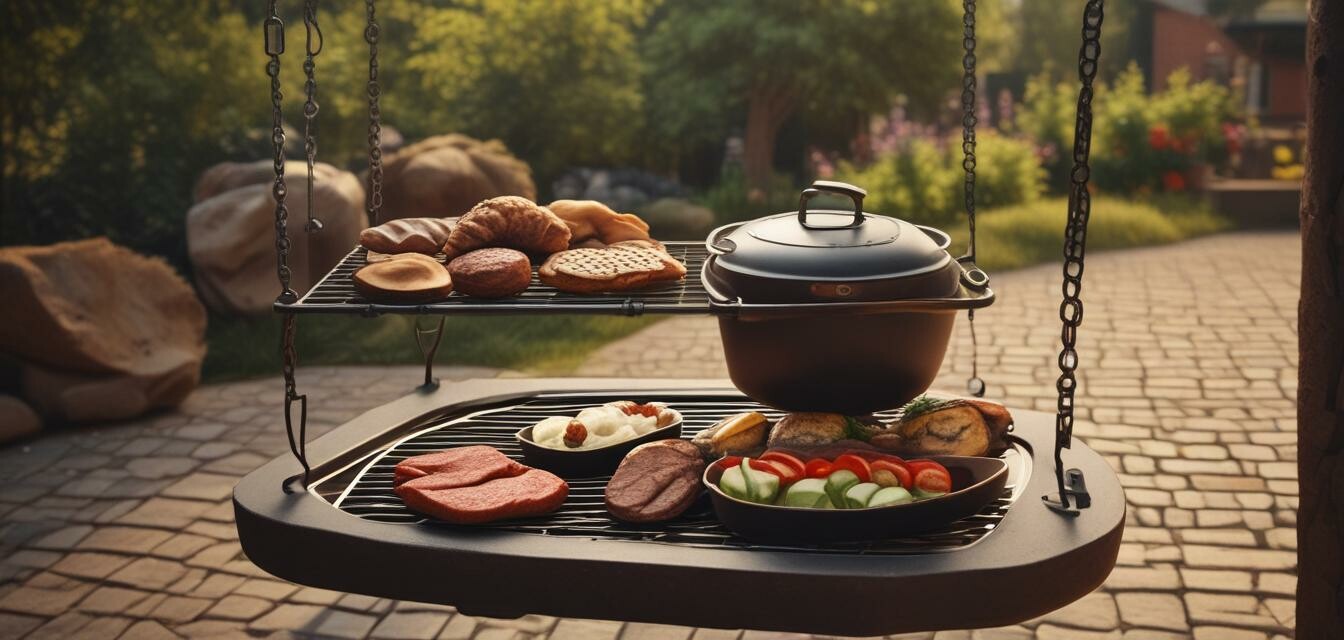
The Ultimate Guide to Choosing a Swing Grill
Key Takeaways
- Understand the essential features of a swing grill.
- Compare different grill types available in the market.
- Assess your cooking needs based on your grilling style.
- Learn about safety and maintenance tips for swing grills.
- Select accessories that enhance your grilling experience.
When it comes to outdoor cooking, a swing grill can be a game-changer. Known for its versatility and unique cooking style, a swing grill allows you to enjoy the art of grilling with ease. In this ultimate guide, we will explore everything you need to consider when choosing the perfect swing grill for your outdoor cooking needs.
What is a swing grill?
A swing grill is a type of outdoor cooking appliance that boasts a pivoting or swinging mechanism, allowing users to adjust the distance of the barbecue surface from the heat source. This innovative design facilitates temperature control, ensuring that your food is cooked evenly and thoroughly.
Key features to consider when choosing a swing grill
| Feature | Importance | Notes |
|---|---|---|
| Material | High | Choose sturdy materials like stainless steel for durability. |
| Size | Medium | Consider the cooking surface and space available. |
| Heat source | High | Decide between charcoal, gas, or wood pellets for grilling. |
| Accessibility | Medium | Ensure the grill is easy to swing and adjust without effort. |
| Price | High | Set a budget while considering the features you prioritize. |
Benefits of using a swing grill
- Enhanced temperature control
- Versatility in cooking styles
- Unique design adds aesthetic appeal to your outdoor space
- Perfect for social gatherings and barbecues
Types of grills to compare
Before settling on a swing grill, it’s essential to understand the different types of grills available. This knowledge will help you make an informed decision based on your personal preferences and cooking style. Below is a comparison table of various grill types you might consider.
| Type of Grill | Pros | Cons |
|---|---|---|
| Charcoal Grills | Good flavor, high heat | Longer cooking time, requires more skill |
| Gas Grills | Easy to use, quick heating | Less flavor than charcoal |
| Wood Pellet Grills | Versatile, great taste | Can be expensive, requires electricity |
| Pizza Ovens | Perfect for pizza, high heat | Less versatile for other foods |
Choosing the right swing grill for your needs
Selecting the ideal swing grill boils down to understanding your specific grilling needs. Here are some factors to think about:
- Cooking Capacity: If you plan to cook for larger groups, consider a grill with ample cooking surface.
- Fuel Type: Determine if you prefer the traditional flavor of charcoal or the convenience of gas.
- Temperature Control: Look for grills that allow you to adjust your cooking distance for better control.
- Budget: Set a budget ahead of time, but be willing to invest a little more in quality.
Maintenance tips for swing grills
Maintaining your swing grill is essential for longevity and performance. Here are some handy tips to keep your grill in top shape:
- Clean the grates after each use.
- Inspect the cooking surface for any damage.
- Store it in a dry place after cleaning.
- Regularly check and replace any worn-out parts.
Grill accessories to enhance your cooking experience
Don't forget about accessories that can improve your grilling experience. Some must-haves include:
- Grilling utensils (tongs, spatula, basting brush)
- Temperature probe for precise cooking
- Grill cover to protect from the elements
- Charcoal chimney starter for easy lighting
Conclusion
Choosing the perfect swing grill involves considering various factors like materials, cooking capacity, heat source, and maintenance. By understanding your needs and weighing your options, you can select the best swing grill that will elevate your outdoor cooking adventures. For a detailed dive into other grill options, check out our Charcoal Grills, Gas Grills, or Wood Pellet Grills sections for more help!
Beginner's Tips for Using a Swing Grill
- Start with simple recipes to gain confidence.
- Don’t rush; allow your food to cook properly.
- Experiment with different heat levels and cooking times.
Pros
- Easy adjustment for cooking temperatures.
- Unique grilling experience that encourages social interaction.
- Durable build allows for long-term use.
Cons
- May require more space to set up.
- Higher initial cost compared to standard grills.